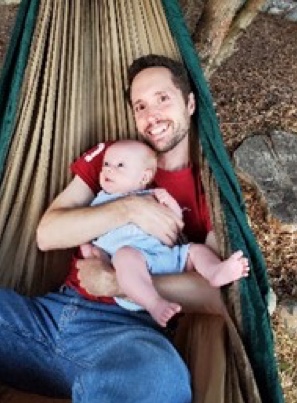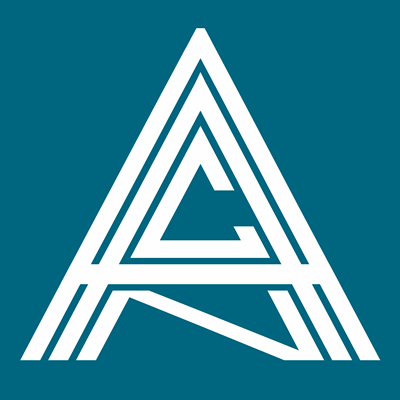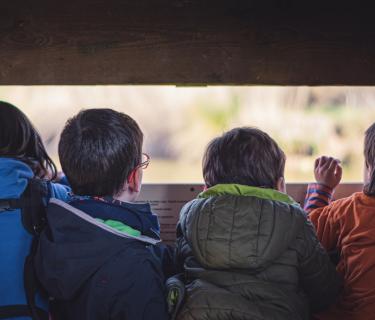
Through a strange set of circumstances my acoustic neuroma (AN) was discovered in 2017. I previously worked for a youth criminal justice program offering an alternative to incarceration to help offenders get onto a positive life path. While playing an intense game of hide and seek tag, a favourite of both participants and staff, I was accidentally kicked in the head.
I suffered a concussion and, during the assessment of my injury, an MRI of my brain revealed that I had an AN on my left side. After hearing my diagnosis, I immediately recognized what they were talking about because
one of my parents also has an AN. However, we do not have NF2, the genetic binomial version of an AN, and I have been told that it is pure coincidence we both have ANs based on the existing research. I have also undergone genetic testing, performed by none other than a Dr. Blood, to see if she could detect genetic markers suggesting our ANs are hereditary. The testing came back saying that no genetic mutations were identified for NF2. However, an increased susceptibility to an AN wasn’t entirely ruled out. I looked it up and, if the odds of having an AN are 1 in 100,000, then by my calculations the odds of both my parent and me having an AN are 1 in 10,000,000,000. I suspect that there just hasn’t been funding to research other hereditary causes of single-side AN.
Fortunately, when my AN was discovered, it was small (11mm x 5mm), and it didn’t seem to be causing symptoms. I was told by my ENT that I would need to go for regular MRIs to monitor the size, but it would only be life threating if I lived in a remote area far from access to advanced medical care. While my ENT mentioned surgery as an option one day, he told me that “watching and waiting” was the best course of action. I decided I needed to make peace with my tumour, which I named Frank, and hoped that we could cohabitate and share the limited space in my brain for years to come. However, Frank had other plans and he has continued grow in size.
Eventually, I arranged a consultation with Dr. Vallieres, a radiation oncologist who outlined the costs and benefits. She said that this procedure carries a lower risk of losing my hearing on the left side, at least initially, no requirement to cut the balance nerve, and would allow me to have little disruption in my life. However, given my young age of 35, there could be long-term risks of developing cancer and other issues by exposing my brain to radiation. While there are no studies showing a link between these radiation procedures and developing brain cancer, these procedures are relatively new and the majority of patients with ANs are older. Therefore, there are lower risks for them using radiation because there is less potential time for negative side effects to develop in the life span of these patients. Dr. Vallieres said that given my age, which should help me recover better from the surgery, the talent of Dr. Akagami (the famed neurosurgeon in BC), and the additional risks for using radiation as a treatment, she would encourage me to consider surgery as an option. She was careful to tell me that both procedures are good choices and that ultimately, I would need to make a personal choice. I was struck by the fact that this physician was recommending a treatment option for me other than her own specialty. I really appreciated her candor and her empathetic approach to my situation.
At a subsequent consult with my ENT, my AN showed enough growth that he suggested I meet with Dr. Akagami. I saw Dr. Akagami in August of 2020. He said that both radiotherapy and surgery were viable options; however, he said the radiotherapy would provide less control of the tumour size and there is a very small risk of radiation-induced tumour growth. In addition, the radiotherapy typically provides about 15 years of control over the tumour at which point the effectiveness decreases. Since I hope to live significantly more than 15 years, this played a factor in my decision. The potential for complete loss of my hearing on my left side was more likely with surgery, but I could get lucky with a 40% chance of hearing preservation. I also understood that while there are risks to my facial nerves, chance of increased neurological deficit and other associated risks of the surgery, given my age and health, as well as the location and size of the tumour, I had a really good chance of a comprehensive recovery from the procedure. While the prospect of having brain surgery seemed daunting, I got a good feeling from Dr. Akagami and many people told me how highly skilled he is, including his ENT partner, who described his hands as “a gift from God!”
It was around this time that my mother did some research and discovered the Acoustic Neuroma Association of Canada (ANAC). Right when I really needed a lifeline, ANAC was there for me. I joined their support group and took comfort in the advice, community and collective wisdom they offered me. ANAC shared a list of top doctors I could contact for a second opinion and sent newsletters with the latest medical information. ANAC connected me with other people in similar circumstances who could share their experiences with the various treatment options, and gave me helpful tips for recovery and living with an AN. Carole Humphries, the Executive Director of ANAC, has been so kind and helpful. Carole has been a strong advocate and support for me, going above and beyond to let me know I’m not alone in this struggle.
I decided to have surgery and got my name on Dr. Akagami’s waitlist in September 2020. I was told that, given my tumour size, I would likely be on the wait list for about a year before I would have my surgery. This was a long time to wait, but I mentally prepared what I like to think of as my “ armour”. I started exercising more, I stopped drinking, and I started doing additional exercises to enhance my balance to prepare for when they cut my balance nerve on my left side to remove the AN. In the spring of 2021, I met with a new ENT who informed me that my AN hadn’t grown in the latest MRI. At ANAC’s AGM this past summer, I learned that tumours can potentially stop growing because they outrun their blood supply.
In May of 2021 my partner and I had been lucky enough to welcome our first child into our lives! Our son Ozzie has been such a blessing during COVID and a real inspiration to help me prepare and plan for recovery from the surgery. I did start wondering if I might be able to “watch and wait” again if my tumour had indeed stopped growing. I emailed Dr. Akagami and learned my ENT had incorrectly assessed my tumour which was in fact still growing at about the same pace. This was really hard news to take. I had been mentally preparing for surgery and the sliver of hope my tumour had stopped growing had weakened my resolve, I think in part because I’m now a parent and worried about how I will care for my son post-surgery.
My MRI in September 2021 showed that my tumour continues to grow, is 16mm by 14 mm, and I am definitely experiencing symptoms. My surgery has been postponed from September 2021 until at least the new year, because of the strain on our healthcare system caused by this pandemic. Nurses are burning out and retiring, and access to operating room time has been limited. This delay is disheartening since now I do not know when I will be able to get this tumour out of my head or if my symptoms will significantly increase before it’s removed.
British Columbia, like many other places worldwide, has seen a spike in the number of COVID cases and number of unvaccinated people in ICUs during the current 4th wave. Hospitals are being pushed to the brink and are having to cancel or delay all kinds of surgeries and medical procedures. This has forced people like me to wait longer for urgent medical procedures and suffer through symptoms.
My hope is that those who are unvaccinated will listen to the advice from the consensus of global medical experts and get vaccinated to bring this pandemic to an end. At the very least, I encourage you to speak with your local health care provider about your concerns and refrain from sharing anecdotal information about COVID-19 vaccines that is unsupported by scientific evidence. My quality of life depends on people getting vaccinated so that I can access the healthcare intervention I need.

